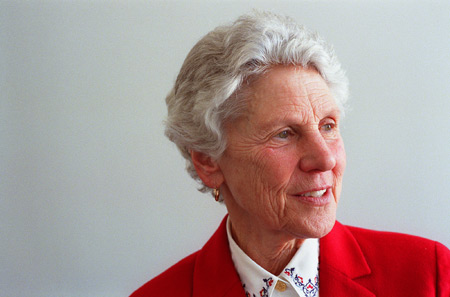Channing the younger
Biography brings obstetrician Channing out of brother’s shadow

In an era before anesthesia, antibiotics, fetal monitoring, X-rays, and genetic screening, childbirth was usually the riskiest and often the most painful experience of a woman’s life.
Women frequently died in childbirth due to conditions such as septic shock and puerperal fever, which resulted from unsterile procedures. Breach births often meant that the baby’s life had to be sacrificed in order to save the mother.
Obstetricians did what they could to reduce the risk and suffering but their effectiveness was limited. One physician who did make significant, indeed groundbreaking, contributions to the field of obstetrics during this time was Walter Channing (1786-1876).
Dean of Harvard Medical School (HMS) and its first Professor of Midwifery and Medical Jurisprudence, as well as one of the first doctors to practice in the newly established Massachusetts General Hospital, Channing had a major impact on medical education in the Boston area as well as on the lives of thousands of women patients.
Channing’s life is the subject of a new biography, “Midwifery and Medicine in Boston” by Amalie Kass (Northeastern University Press, 2002). Kass is a lecturer on the history of medicine at HMS. With her late husband, Edward Kass, a professor at the Medical School and founder and longtime head of the Channing Lab, she co-wrote “Perfecting the World: The Life and Times of Thomas Hodgkin, M.D.” (Harcourt, Brace, Jovanovich, 1988).
Kass undertook the Channing biography in order to better understand a significant shift in medical practice that took place during the early 19th century – the supplanting of traditional female midwives by professionally trained male physicians.
Reading the literature on the subject, Kass found there are essentially two radically opposed points of view. One side interprets the shift as the triumph of scientific expertise over vernacular practice, while the other sees it as yet another way men were taking control of women’s lives. Kass thought that a study of Channing’s life might yield a more accurate, less tendentious, historical interpretation of the subject.
“I thought that if I could better understand this change from the point of view of a physician-educator, I could gain a better grasp of what the issue was all about,” Kass said.
Her research convinced her of Channing’s sincere dedication to relieving the suffering of women and advancing the state of medical knowledge in his chosen field.
“I think you have to judge people by their own times,” she said. “Channing was as good a doctor as he knew how to be. He was compassionate, he cared about social reform, and he had a deep concern for women’s lives. He could be difficult, querulous, and self-pitying, but he was also very dedicated to his patients.”
That dedication extended to his family as well.
“When his daughter-in-law died, he took responsibility for the care of his five grandchildren. He was 70 years old at the time. There aren’t many people who would be willing to do that.”
Channing’s reputation has long been overshadowed by that of his older brother, William Ellery Channing, the noted Unitarian minister, writer, and social reformer. (Indeed it is for the elder Channing that Channing Laboratory is named.) Kass felt it was high time Walter Channing’s long and influential career was rescued from undeserved obscurity.
Channing received his M.D. degree from the University of Pennsylvania in 1809, then traveled overseas for further training in England and Scotland, which were on the forefront of medical and obstetrical knowledge. Thus, when Channing set up practice in Boston in 1811, he brought back with him the latest developments in obstetrical medicine.
Throughout his long career, he continued to serve as an advocate for progressive causes, both in medicine and in society generally. Some of these causes are reflected in the titles of his published papers: “Address on the Prevention of Pauperism,” “A Plea for Pure Water,” and “Treatise on Etherization in Childbirth.”
The use of anesthesia in childbirth was a special concern of his, according to Kass.
“He saw no reason why women should have to suffer pain,” she said. “He faced opposition from religious people who believed that pain in childbirth was punishment for Eve’s sin.”
He also faced limitations imposed by the strict decorum that governed matters pertaining to sex and childbirth at this time. Because it was considered a grave impropriety for male physicians to view their female patients’ private parts, Channing and his colleagues conducted pelvic exams by touch only, scrupulously avoiding any visual contact.
Adding to the limitations that obstetricians worked under in Channing’s time was the fact that most women gave birth at home. Hospitals were only for the poor and indigent. Prenatal care was practically unknown, so when the physician entered a woman’s home to assist in the delivery, it was often the first time the two had met.
“One thing I think we can learn from Channing’s story is how lucky we are,” Kass said. “Today, we have the luxury of knowing that if something goes wrong, help is not far away, as well as the advantage of knowing about many problems in advance. Physicians in the 19th century didn’t have those advantages, and when things did go wrong – as they often did – there was comparatively little they could do.”




